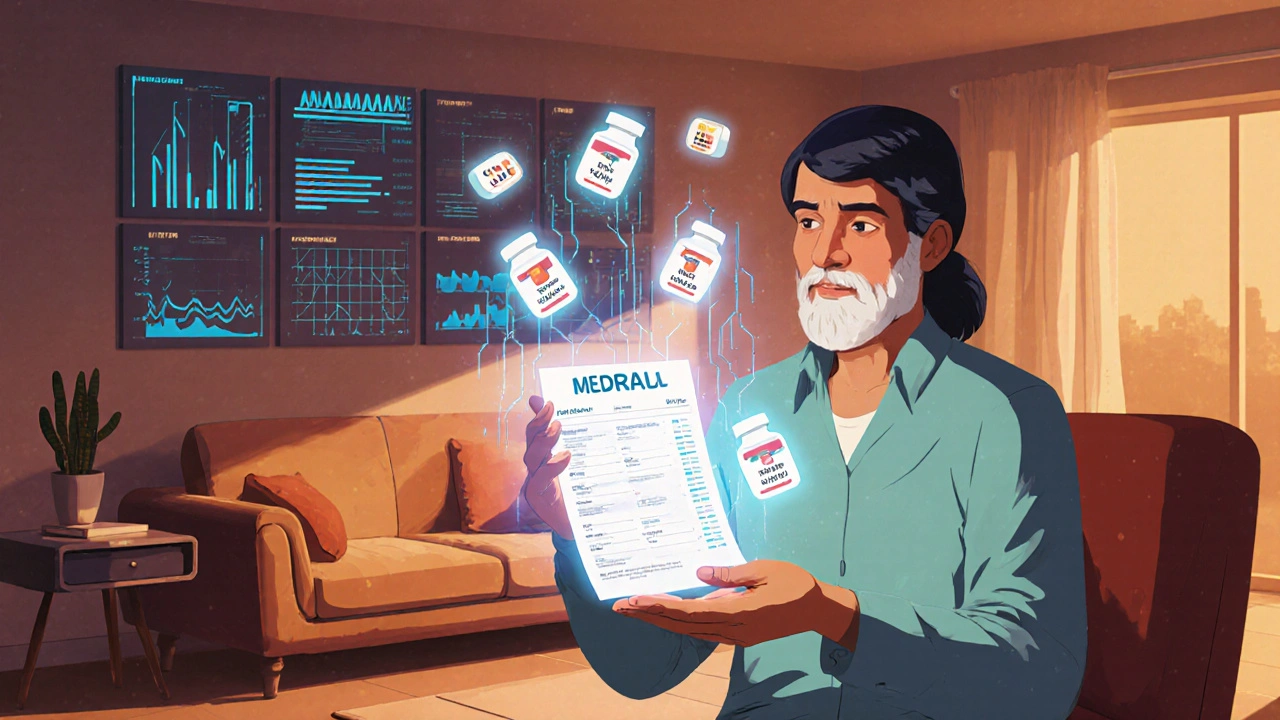
Taking pills every day for years isn’t just routine-it’s life-saving. But it’s also risky. If you’re managing a chronic condition like diabetes, high blood pressure, or arthritis, you’re likely on multiple medications. And the longer you take them, the more dangerous things can get if you’re not careful. Medication errors don’t always come from forgetting a dose. They come from interactions you didn’t know about, side effects you ignored, or pills you kept taking even when they no longer made sense. The good news? You can drastically reduce those risks with simple, consistent habits.
Keep a Real-Time Medication List
You can’t manage what you can’t see. Most people think they remember all their meds-until they’re asked to list them during an emergency. A 2023 study found that 67% of medication errors during hospital transitions happened because the patient’s medication list was outdated or missing. That’s not just a paperwork problem-it’s a life-or-death gap. Start with a physical list you carry in your wallet or phone. Include every pill, patch, injection, and supplement. For each one, write:- Full name (brand and generic if different)
- Dosage (e.g., 10 mg, 500 mg)
- How often to take it (e.g., once daily, every 8 hours)
- Why you’re taking it (e.g., “for blood pressure,” “for joint pain”)
- When you last refilled it
Know the 7 Rights of Safe Medication Use
Healthcare workers use the “7 Rights” to prevent mistakes. You should use them too. Before you take any pill, ask yourself:- Right patient? Is this medicine really for me? (Don’t grab a bottle labeled “Mom’s blood pressure pills.”)
- Right drug? Does the label match your list? Check the color, shape, and name.
- Right dose? Is this the amount your doctor told you? Don’t guess.
- Right route? Is it meant to be swallowed, sprayed, injected, or applied to skin?
- Right time? Are you taking it with food? At bedtime? Every 6 hours?
- Right documentation? Did you log it in your journal or app? (This helps spot patterns.)
- Right reason and response? Why are you taking this? And have you noticed any new symptoms since you started?
Watch for Polypharmacy Traps
Taking five or more medications at once is called polypharmacy. It’s common-especially if you see multiple specialists. But it’s also the biggest risk factor for serious side effects. The American Academy of Family Physicians found that older adults on five or more drugs are 2.5 times more likely to fall, have confusion, or be hospitalized. Here’s what to do:- Ask your primary doctor, “Can we review all my meds together?” Don’t wait for them to bring it up.
- Request a full medication reconciliation every 6 months-even if you feel fine.
- Be suspicious of “just one more” pill. If a new drug was added without explaining why, ask: “What problem is this solving? What risks does it add?”
Use Technology Wisely
Technology helps-but only if you use it right. A 2024 study showed that patients using digital pill reminders had 55% fewer missed doses than those relying on memory. Try these tools:- Smart pill dispensers: Devices like MedMinder or Hero dispense pills at set times and send alerts to your phone or family.
- Medication apps: Use apps like MyTherapy or Medisafe to track doses, refill dates, and side effects. Sync them with your pharmacy.
- Barcode scanning: If your pharmacy offers it, scan your prescription label with your phone to get a video explanation of how to take it.
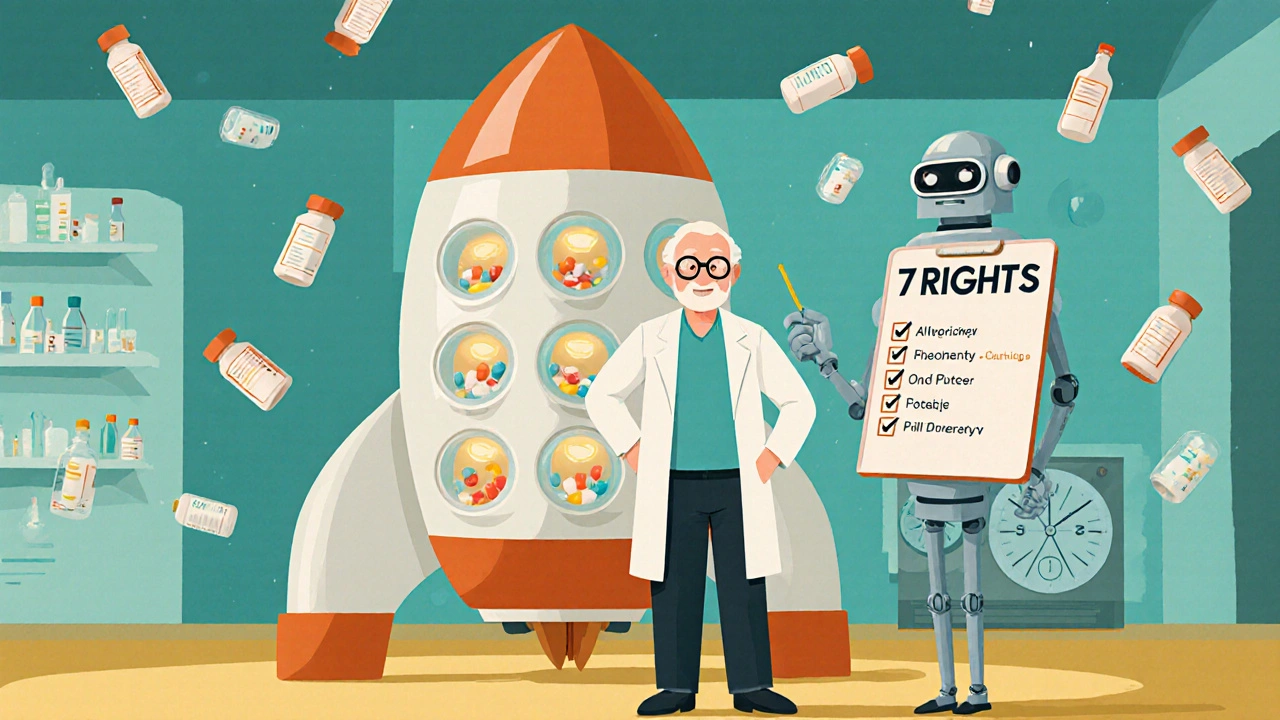
Don’t Ignore Side Effects-Track Them
Fatigue? Dizziness? Nausea? Constipation? These aren’t “just part of aging.” They could be side effects you’ve accepted too long. Start a simple side effect journal. For each new symptom, note:- What happened
- When it started
- Which meds you took that day
- How long it lasted
Get Help with Costs and Access
One in four Americans skips doses because of cost. That’s not just inconvenient-it’s deadly. Missing insulin or blood pressure meds for a few days can send you to the ER. Ask your pharmacist or doctor about:- Generic alternatives
- Manufacturer patient assistance programs
- 30-day vs. 90-day fills (often cheaper)
- Mail-order pharmacies for maintenance meds
Never Stop Cold-Even If You Feel Fine
It’s tempting. You’ve been on blood pressure meds for 3 years. You feel great. Maybe you don’t need them anymore? Wrong. Stopping suddenly can cause rebound effects: spikes in blood pressure, seizures, or heart attacks. Always talk to your doctor before quitting a medication-even if you think it’s helping less. Some drugs need to be tapered slowly. Others, like antidepressants or steroids, can cause dangerous withdrawal. If you’re thinking of stopping, say: “I feel better. Can we check if I still need this?” Not: “I’m done with this pill.”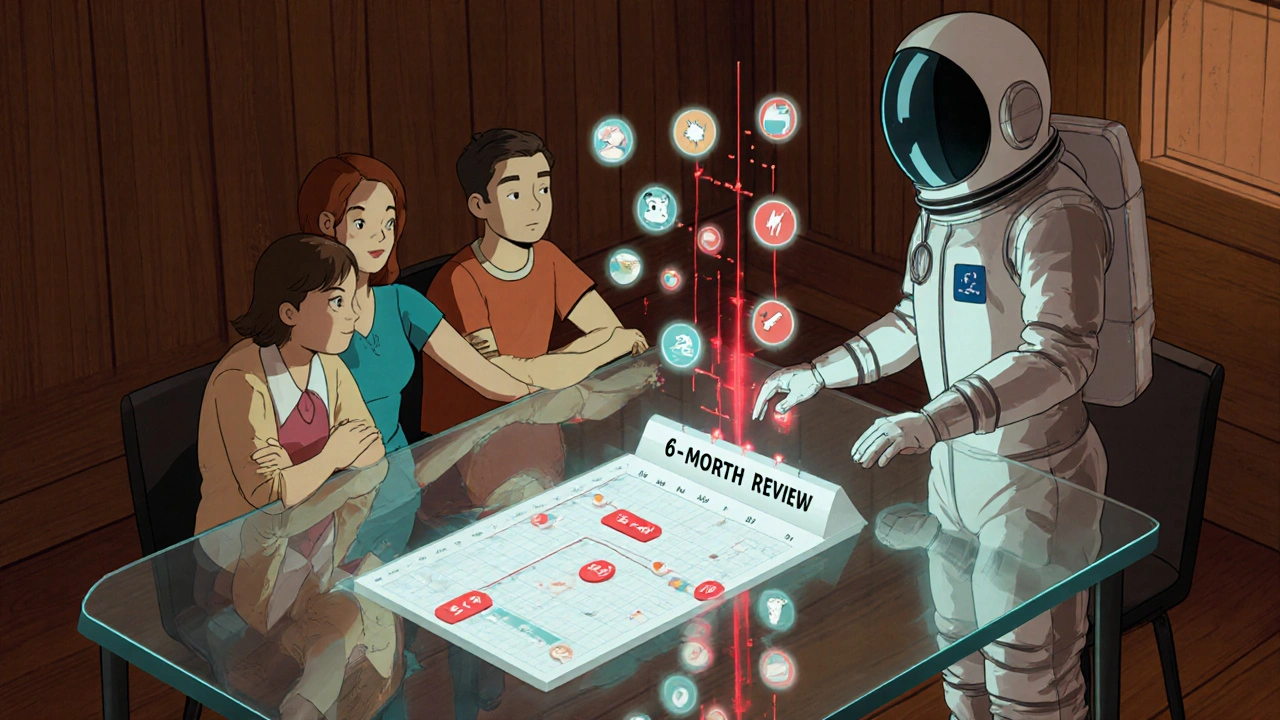
Build a Support System
Managing meds long-term is a team sport. You can’t do it alone. Identify one trusted person-spouse, child, neighbor-who can:- Help refill prescriptions
- Spot if you’re confused about doses
- Call your doctor if you miss several doses
- Keep a backup copy of your medication list
Review Your Meds Every 6 Months
This is the most powerful habit you can adopt. Set a calendar reminder: every January and July, schedule a “medication check-up.” Bring your list. Your journal. Your questions. Ask:- Is every drug still necessary?
- Are any of these causing more harm than good?
- Is there a newer, safer option?
- Can any doses be lowered?
What Happens If You Don’t?
Ignoring medication safety isn’t just risky-it’s costly. The CDC estimates medication non-adherence causes 125,000 deaths in the U.S. every year. It also adds $100-$300 billion to healthcare costs. But beyond the numbers, it’s personal. Missed doses lead to worsening disease. Worsening disease leads to more pills. More pills lead to more side effects. More side effects lead to more doctor visits. It’s a spiral. You don’t have to be perfect. But you do have to be intentional. One list. One journal. One check-up every six months. That’s enough to break the cycle.Can I stop taking a medication if I feel better?
No-not without talking to your doctor. Many chronic condition medications work to prevent problems, not just treat symptoms. Stopping suddenly can cause dangerous rebound effects, like spikes in blood pressure, seizures, or heart issues. Always ask, "Can we check if I still need this?" before making any changes.
How do I know if I’m taking too many pills?
If you’re taking five or more medications daily, you’re in the polypharmacy risk zone. Signs include confusion, dizziness, falls, fatigue, or digestive issues that started after adding a new drug. Ask your doctor for a full medication review every 6 months. They can identify duplicates, unnecessary prescriptions, or dangerous combinations.
What should I do if I miss a dose?
Check the label or call your pharmacist. For most chronic meds, if you miss a dose by a few hours, take it as soon as you remember. If it’s almost time for the next dose, skip the missed one. Never double up unless instructed. Keep a log of missed doses-this helps your doctor spot patterns.
Are supplements safe to take with my prescription meds?
Not always. Supplements like St. John’s Wort, garlic, ginkgo, or high-dose vitamin E can interfere with blood thinners, blood pressure meds, and antidepressants. Always tell your doctor and pharmacist exactly what supplements you take-even if you think they’re "natural" or "harmless."
How can I save money on long-term medications?
Ask your pharmacist for generic versions, use 90-day fills instead of 30-day, check manufacturer patient assistance programs, and use mail-order pharmacies. Many pharmacies offer $4 lists for common chronic condition drugs. Don’t skip doses because of cost-there are almost always affordable options.
Should I use a pill organizer?
Yes-if you take multiple pills daily. A simple 7-day organizer can prevent missed or double doses. But don’t rely on it alone. Always check the labels inside the organizer against your medication list. Some pills can’t be moved (like extended-release tablets), and some lose potency if stored long-term in plastic.
What’s the biggest mistake people make with long-term meds?
Assuming they don’t need to review their meds. Most people think if they’ve been on a drug for years, it’s fine. But your body changes. New conditions arise. New drugs are added. What was safe 5 years ago might be risky now. Regular reviews are the most effective way to stay safe.
Denny Sucipto
This is the kind of post that actually saves lives. I’ve seen my dad forget his meds for days because he ‘felt fine’ - then ended up in the ER. The 7 Rights checklist? I printed it and taped it to his medicine cabinet. Game changer.
Iska Ede
So you’re telling me I’m not just lazy for not tracking my meds… I’m basically a walking death sentence? Thanks for the guilt trip, doc.
steffi walsh
I started using MyTherapy last year and honestly? It’s like having a tiny nurse in my pocket. I even got my mom to use it - she said she feels less alone now. You’re not just managing pills, you’re managing peace of mind. 💪❤️
Holly Powell
While the sentiment is commendable, the article lacks any citation of clinical guidelines from the American College of Clinical Pharmacy regarding polypharmacy risk stratification. The 2023 study referenced is not peer-reviewed in a major journal - it’s a CDC white paper. Please consult Beers Criteria before advising laypersons to self-manage complex regimens.
Riohlo (Or Rio) Marie
Oh, so now we’re supposed to become pharmaceutical accountants? Keep a list? Track side effects? Ask questions? How quaint. The system is designed to keep you dependent, not safe. Your ‘simple habits’ are just Band-Aids on a bullet wound. The real issue? Pharma lobbying. The real solution? Single-payer and mandatory deprescribing audits. But no - let’s just make patients do more work. Classic.
Heidi R
My sister took her husband’s blood pressure pills by accident. He had a stroke. She didn’t even know they were different. This post should be mandatory reading. Everyone. Everywhere.
Katelyn Sykes
Just started a side effect journal after my doc said my dizziness was probably from the new statin. Turns out it was the fish oil I was taking with it. I thought it was 'natural' so it was fine. Nope. Now I ask about every supplement like it’s a bomb. Thanks for the wake up call
Emanuel Jalba
THEY’RE LYING TO YOU. 🚨 Your meds are making you sick on PURPOSE. They want you dependent. That ‘$4 generic’? It’s laced with fillers. That ‘pill dispenser’? It’s tracking you. That ‘review every 6 months’? They’re just trying to sell you more pills. I stopped all mine. I eat turmeric and breathe deep. I’m 72 and feel better than I did at 40. 🌿✨
Shaun Barratt
While the general principles outlined are sound and empirically supported, the absence of a standardized taxonomy for medication adherence metrics undermines the scalability of the proposed interventions. A longitudinal cohort study utilizing the Morisky Medication Adherence Scale (MMAS-8) would provide greater methodological rigor.
Gabe Solack
My grandma uses a pill organizer with a lock. I set up a weekly text reminder to her phone - if she doesn’t reply, I call. She says it makes her feel cared for, not controlled. Small things, big difference. ❤️
Leilani O'Neill
Why are we letting Americans turn healthcare into a DIY hobby? In Ireland, we have GPs who manage this. You don’t need a spreadsheet. You need a system. This post reads like a corporate wellness blog written by someone who’s never met a real patient.
Conor McNamara
they put chips in the pills to track you… i saw it on a video… the app syncs with your phone and sends data to the gov… the ‘reminder’ is really a signal… dont trust the meds… dont trust the list… dont trust the pharmacist… they know when you skip…
Gabriella Jayne Bosticco
My partner has type 1 diabetes and I’ve learned to read his blood sugar logs like a novel. The real magic isn’t the app or the list - it’s showing up. Sitting with him while he takes his shot. Asking ‘how’s your foot feeling today?’ That’s the safety net. The rest is just paperwork.
Sarah Frey
Thank you for this comprehensive and clinically grounded overview. The emphasis on medication reconciliation and patient empowerment aligns with current best practices in chronic disease management as outlined by the Joint Commission and the CDC’s Medication Safety Program. This is precisely the kind of public education that reduces avoidable harm.
Brenda Kuter
My aunt died because her doctor didn’t check her meds. She was on 14 pills. No one ever asked if they were still needed. They just kept adding. I’m never letting anyone do that to me. I’m done. I’m done with doctors who treat me like a vending machine. I’m done.

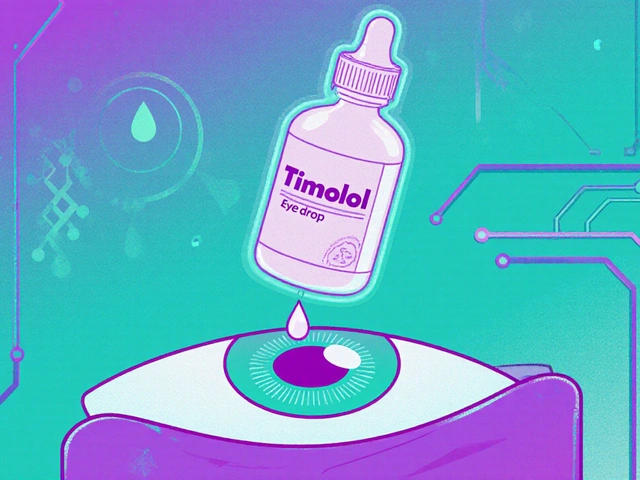

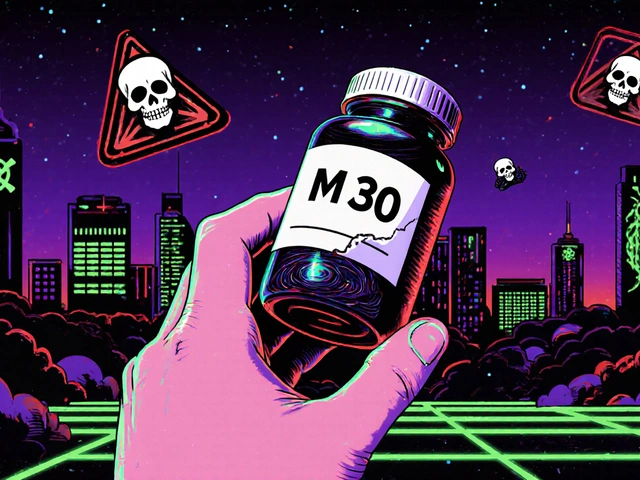

Write a comment